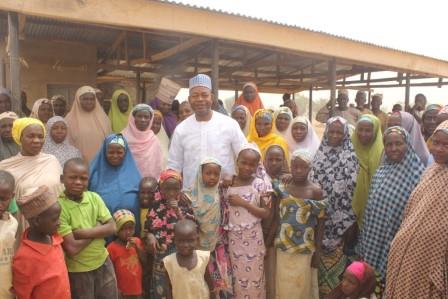The Climate Change agreement will be opened for signature on 22 April 2016, coinciding with Earth Day. At the Paris climate conference (COP21) in December 2015, 195 countries adopted the first-ever universal, legally binding global Climate Agreement. The agreement sets out an action plan to put the world on track to avoid dangerous climate change by limiting global warming to well below 2°C.
As governments begin to sign the Paris Agreement, International Centre for Energy, Environment & Development (ICEED) urges the Nigerian government to ratify this agreement and seize the opportunity to make Nigeria’s poor part of the climate change solution.
Climate change represents a clear and present danger to Nigeria’s development. Agriculture makes up about 30% of Nigeria’s GDP and accounts for almost half of all employed adults. As less than 10% of farming in Nigeria is irrigated, fluctuations in rainfall patterns threaten the livelihood of most farmers. Climate smart agriculture with irrigation, improved seeds, technology, extension services, information, finance, especially agricultural insurance are some part of the toolbox for protecting Nigeria’s poor farmers against the ravaging forces of global warming.
Access to sustainable energy services is crucial in efforts to escape poverty. Today, nearly half of all households in Nigeria are not connected to the grid. Small businesses and households with access to the grid have no power. Solar energy and other off-grid solutions present important opportunities to empower the poor with low carbon technologies. The poorest region in Nigeria – the Northeast, has the best solar radiation! Let’s move from climate talk to climate action and provide solar power for the reconstruction and development of the Northeast.
Seven out of ten households in Nigeria use three stone stoves in open fire. Smoke from firewood cooking is the killer in the kitchen. According to the WHO, nearly one hundred thousand lives are lost annually in Nigeria as result of smoke from the kitchen. Greenhouse gas emissions from millions of open fires contribute to global warming. We can do something about this!
Nigeria exports four million tons of climate-friendly cooking gas and consumes only 350 thousand tons – less than ten percent. But we import and subsidize dangerous and dirty kerosene. This is an energy and climate policy turned on its head!
Providing access to climate compatible pro-poor energy services will create new jobs, stimulate the economy, especially in the Northeast and address health concerns and deforestation. ICEED calls on the Federal Government of Nigeria to ratify the Paris Agreement and seize the opportunity to make Nigeria’s poor part of climate solution.
Contact: Adewale Ajibade, International Centre for Energy, Environment & Development. Telephone- 08035985232 e-mail- adewale@iceednigeria.org

